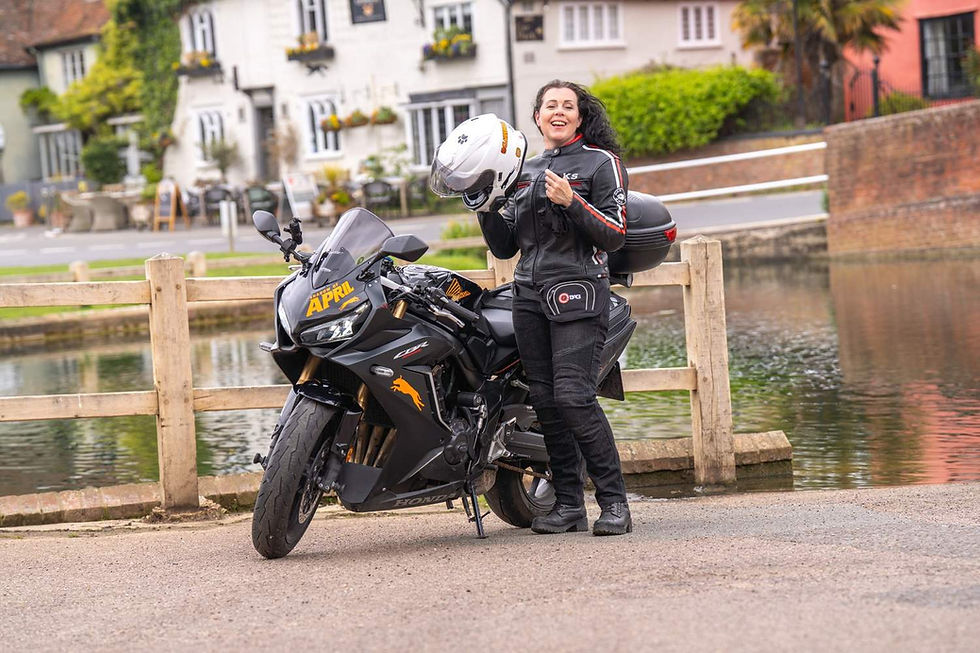The Story Behind YourOneLife – Exclusive Interview With Claire Jones
- Brainz Magazine

- Sep 10, 2025
- 4 min read
Updated: Sep 11, 2025
Claire Jones is an award-winning weight loss and mindset coach, author of How to Eat Less, and founder of YourOneLife. With a background in senior NHS leadership, personal training, behaviour change, and psychological coaching, Claire blends lived experience with professional insight to help people finally feel free around food, and in control of their health.
Her coaching offers a refreshing alternative to the rigid plans and “just be more disciplined” advice of traditional programmes. Whether supporting clients with or without taking GLP-1 medications like Ozempic or helping new motorcyclists manage fear on the road, Claire’s belief-led approach focuses on identity, emotional regulation, and long-term stability.
We spoke with Claire to hear how she built her business, what drives her, and why she’s on a mission to disrupt the way we talk about weight loss and confidence.

Claire Jones, Weight Loss and Confidence Coach
Tell us more about your background and how YourOneLife came to be.
My journey blends senior leadership in the NHS, training in weight management, behaviour change, and coaching, and perhaps most importantly, decades of personal struggle with food and body image.
The turning point for me was realising that most people don’t fail at weight loss because they don’t know what to eat. They struggle because no one taught them how to feel safe, structured, and emotionally supported during, and after, the process. That’s what I needed to figure out for myself, and it’s what I now help others with.
So I left my NHS role to create a deeper kind of coaching. One that focuses not on short-term compliance, but long-term identity change. That became YourOneLife. As we each only get one and it’s up to us to make the most of it.
What makes YourOneLife different from traditional weight loss coaching?
I don’t just coach the plan. I coach the person.
My approach is belief-led, nervous system-informed, and completely tailored. There are no cookie-cutter macros or shame-based tactics. Instead, we look at identity, emotional regulation, patterns of behaviour, and how to build lasting habits without relying on willpower alone.
Most of my clients have tried everything. What they’re missing isn’t knowledge. It’s safety, structure, and strategy that fits their real life.
What kind of people do you work with?
My clients are typically smart, high-achieving adults – often, but not always, women in their 30s to 60s. Some have been using or coming off GLP-1 medications like Ozempic or Mounjaro, and some are doing it naturally. Some have lost a lot of weight quickly before coming to me but now feel stuck, scared, or on the edge of relapse. Others are just exhausted from years of dieting.
I also support people who feel disconnected from their body and want to rebuild trust, without obsession, fear, or moralising food choices.
And in a completely different lane, I coach new and nervous motorcyclists who feel overwhelmed, anxious or held back during training. Many are women over 40, dealing with life stress, menopause and other things that affect their performance. It might sound unrelated but confidence, mindset, and performance under pressure are universal.
How did the motorcycle mindset coaching come about?
I learned to ride a motorcycle at 50 and I found it incredibly emotionally confronting. I’d freeze during lessons, panic in low-speed manoeuvres, and spiral into self-doubt. It reminded me so much of what my weight loss clients describe – the pressure, the performance anxiety, the inner critic saying “you should be better than this.”
That’s when it clicked. What holds people back isn’t usually skill, it’s mindset. So I developed a mindset-first offer for riders who want more than just technical instruction. I help them regulate their nervous system, rebuild belief, and enjoy the process, not just survive it. My free guide, Seven Truths Every New or Nervous Motorcycle Rider Deserves to Know, is available for download via my website.
What’s something you wish more people understood about weight loss?
That fast results don’t equal lasting change. You can lose weight and still be terrified of gaining it back. You can reach your “goal” and still feel like food controls you.
We need to stop treating weight loss as the finish line, and start treating it as a process that requires emotional safety, nervous system regulation, patience and deep habit work.
Also, people need to take breaks. Trying to lose weight continuously without psychological or physiological reset is a fast track to burnout. Your body will push back, and your brain will too.
What happens when someone finishes a round of Ozempic or Wegovy and feels lost?
That’s one of the biggest issues I see right now. These medications are powerful tools, but they rarely come with adequate behavioural support, and that which is offered tends to be optional, and not frequently accessed. So people lose weight, often very quickly, but without building the mental and emotional resilience to maintain it.
When the medication stops working or becomes unaffordable, the appetite returns, but their inner self-identity hasn’t shifted. The result feels fragile. I am well placed to coach people in this exact moment, helping them rebuild trust, create structure, and find peace without relying on external control.
Sometimes that means we don’t pursue further weight loss immediately. We stabilise first. We look at binge/restrict cycles, emotional hunger, under-eating, all of it. Once there’s consistency and safety, weight loss can resume, and in a way that lasts.
What’s been your greatest achievement so far?
There’s the book (How to Eat Less), the press, passing my motorcycle tests, and the hundreds if not thousands of people that my work has had a positive impact on… but honestly, it’s the messages from people who say, “I finally feel normal again. I’m not scared of food anymore,” or “I love going out riding on my motorbike.”
That’s everything.
Read more from Claire Jones


.jpg)






